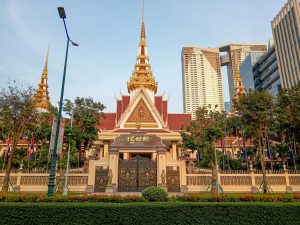Cambodia has amended its constitution to allow for Cambodian citizenship to be stripped from individuals who are accused of conspiring or colluding with foreign forces.
In a Facebook post yesterday, former Prime Minister Hun Sen announced that King Norodom Sihamoni had approved the amendment on July 15, a day after it passed the Senate by a vote of 58-2.
As Camobja News reports, the law amends Article 33 of the constitution, which previously stated that Khmer citizens “shall not be deprived of their nationality.” This line has now been removed and that “acquisition and loss of Cambodian citizenship, including withdrawal, shall be determined by law.”
The change was proposed by Hun Sen on June 27, during a visit to troops serving along the disputed border with Thailand. He said that the country “cannot [accept] foreign interference through any Cambodian for their own interest,” and needed a law to strip the citizenship of those who “side with foreign nations to harm our country.”
The change was duly approved by the National Assembly on July 11. The criteria and process by which citizenship can be revoked will now be clarified through amendments to the 1996 Law on Nationality.
The change has been hotly criticized by opposition figures and human rights groups, which have expressed concern that the new powers are both unnecessary, and will be misused by the Cambodian People’s Party (CPP) government, which has often targeted its opponents with vague accusations of foreign collusion and treason.
As Mu Sochua, an exiled opposition figure, wrote in these pages on July 10, the amendment will “become a potent weapon in the Cambodian regime’s already formidable arsenal to silence dissent – not just at home, but globally.”
Ny Sokha, the president of the human rights group Adhoc, similarly told CambojaNews the proposed amendment could “disproportionately target opposition groups.” “We have observed that institutions which have the authority to impose punishments on political groups have yet to make truly independent decisions,” Sokha said. Even Kim Phea of the Royal Academy of Cambodia, a generally pro-CPP institution, argued that the change was unnecessary, given that the Criminal Code already outlaws treason and other high crimes.
The main target of the law may well be Cambodian exiles, many of whom also hold or have sought to acquire foreign citizenship. For years, Hun Sen and the CPP have attempted to curtail the influence of opposition figures holding French, U.S., or Australian passports, due to time spent as exiles or refugees. Hun Sen has long accused of having one foot in foreign countries, and lobbying their governments to adopt a more robust policy toward Cambodia, in the face of the CPP’s steady erosion of basic political freedoms. In 1996, he warned his opponents, “Don’t say you are Khmer when it is easy and American when it is difficult.”
The last amendment to the Cambodian Constitution, which took place in 2021, introduced a clause barring Cambodians with dual citizenship from holding high government office. This, too, was initiated after a public proposal by Hun Sen and swiftly passed by the National Assembly.
With the right to determine the nature of foreign “collusion” in the sole hands of Cambodia’s politically-captured judiciary, the legal change will almost certainly be used to advance the political crackdown that has seen Cambodia evolve from a limited democracy to more or less open authoritarianism over the past decade.

































